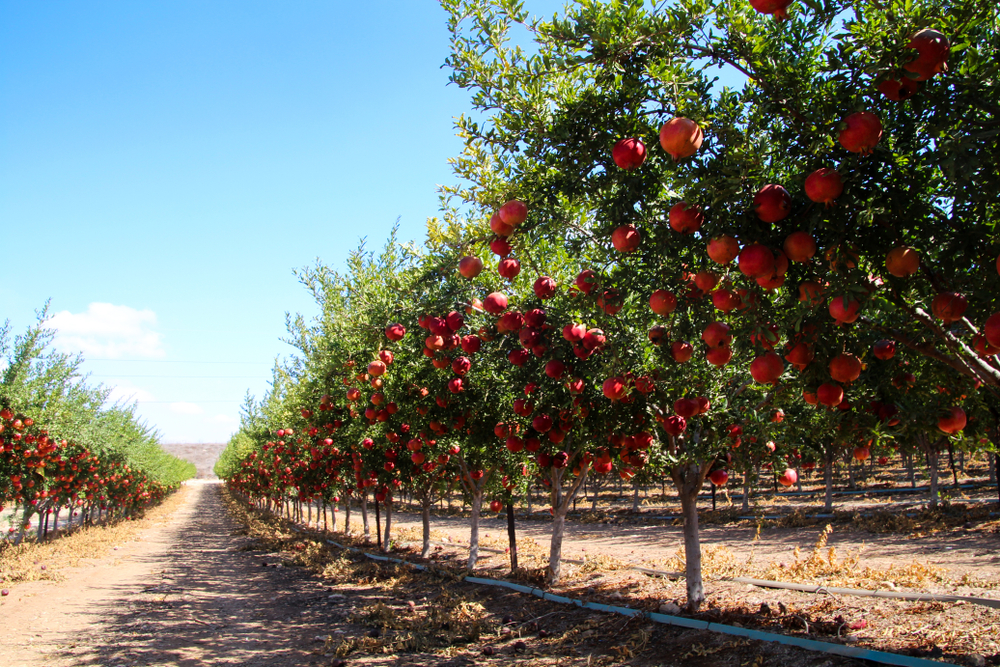Pomegranates are round ruby-red fruits filled with hundreds of arils of the same color. The fruit is a container of seeds – tasty enticements meant to be consumed by animals, a plant's propagating strategy. Their sweet flavor and eye-candy aesthetics are hard to pass when presented on a plate.
Fortunately, the perks of pomegranate arils continue beyond their appeal. According to research, the seeds are abundant in antioxidants![]() , polyphenols, vitamins, and minerals that positively impact mental and physical health. Their bioactive compounds help fight off free radicals and keep inflammation at bay.
, polyphenols, vitamins, and minerals that positively impact mental and physical health. Their bioactive compounds help fight off free radicals and keep inflammation at bay.
There is a reason why dieticians recommend this fruit specifically – it improves the performance of two important body parts – brain and heart – and also lowers the risk of the development of dangerous cancer cells. Refer to the ‘Health benefits' Paragraph to learn more about the science-backed benefits of pomegranate consumption.
Pomegranate (Punica granatum) is sometimes referred to as a Chinese apple. Its Latin name means ‘seeded apple.'
It is not only rich in taste but also history. The use of pomegranates can be traced down to the ancient times of the Mediterranean region. They were not only a food resource but also used as a remedy for various health problems.
In ancient writings, it was known as the sacred fruit linked to fertility, luck, and abundance. It was also featured in Babylonian Talmud, Old Testament, and Egyptian art and mythology.
Pomegranate is native to the region of today's Iran and Northern India. Spanish conquistadors and traders introduced them to the United States in the 1700s. 99% of pomegranates in the U.S. are cultivated in California![]() .
.
Aside from the United States, the largest pomegranate markets include China, Egypt, Saudi Arabia, Pakistan, Afghanistan, Iran, India, Iraq, Bangladesh, and Burma.

Pomegranate seeds are rich in diverse nutritional content ranging from vitamins and micro- and macro-elements to chemical compounds essential for basic body functions.
One serving of 100 grams of pomegranate arils has only 83 kcal and contains the following nutrients![]() :
:
One thing worth remembering is that pomegranate products like juice, syrup, or jam provide different nutrients than raw, ripe pomegranate seeds.
For instance, according to FoodData Central of the U.S. Department of Agriculture, the same amount of pomegranate juice has modest Vitamin C and foliate content![]() . It also offers fewer micro- and macro-elements than the raw fruit.
. It also offers fewer micro- and macro-elements than the raw fruit.
Pomegranate arils can play an important role if eaten on a day-to-day basis. The following health benefits have been linked to pomegranate consumption:
Chemical compounds that reduce the number of free radicals in the body are called antioxidants.
These beneficial substances keep cells from environmental harm, such as toxins, pollution, and cigarette smoke. They also help prevent DNA damage that can result in cancer.
High amounts of free radicals and toxins in the body lead to various severe conditions. Fortunately, there are many foods to choose from that contain substances with antioxidant properties.
Pomegranate seeds are a great choice to provide your body with the fuel it needs to reduce oxidative damage to its cells. Its arils have high concentrations of antioxidants and polyphenols![]() , even among fruits.
, even among fruits.
Substances with antioxidant properties that are present in pomegranate seeds are as follows:
Low antioxidant activity in the body can result in bad overall health. Consumption of fruits abundant in antioxidants prevents serious health issues and promotes good well-being.
Some studies suggest that compounds in pomegranate arils may help combat harmful germs in the body. They may be effective against bacteria, yeast, and fungi![]() in the mouth that cause tooth decay and bad breath.
in the mouth that cause tooth decay and bad breath.
The study results are not surprising, as the arils have been used as an antimicrobial countermeasure since ancient times. It was believed that it could overcome the following health issues:
What is more, pomegranate arils not only reduce the number of microorganisms but also stimulate the growth of good ones. For instance, it promotes the development of beneficial gut bacteria that helps overcome infections.
There is strong evidence that polyphenols present in pomegranate arils have a noticeable impact on cognitive abilities, especially memory![]() . According to the study published in Evidence-Based Complementary and Alternative Medicine, pomegranate seeds can protect reduce and protect from memory issues caused by heart surgery.
. According to the study published in Evidence-Based Complementary and Alternative Medicine, pomegranate seeds can protect reduce and protect from memory issues caused by heart surgery.
Drinking pomegranate juice daily may also help with mild memory problems among middle-aged and older adults. Improved markers of visual and verbal markers were observed in the group that drank the juice, while the placebo group's markers haven't improved.
Several animal studies also suggest that pomegranate extract may be effective against Aizheimer's disease.

Like free radicals, inflammation takes its toll on the overall health. It can lead to such issues as type 2 diabetes, heart disease, weight gain or weight loss, cancer, depression, and mood disorders. There are many reasons to try to reduce the chance of chronic inflammation to a minimum.
Pomegranate seeds contain polyphenols which have both antioxidant and anti-inflammatory properties![]() . It was confirmed in one 2017 study performed on rodents that suggest that pomegranate juice helps control such inflammatory diseases as metabolic and cardiovascular disorders, Inflammatory bowel disease (known as IBD), and rheumatoid arthritis (RA).
. It was confirmed in one 2017 study performed on rodents that suggest that pomegranate juice helps control such inflammatory diseases as metabolic and cardiovascular disorders, Inflammatory bowel disease (known as IBD), and rheumatoid arthritis (RA).
Although the research results are promising, more high-quality evidence is needed to confirm whether pomegranate aids humans in their battle against inflammation as effectively as it does in animals.
There are more benefits linked to antioxidants in the pomegranate arils' juice. Polyphenols and antioxidant substances found in the seeds may lower blood pressure, improving the heart's health.
One study conducted in 2013 found that regular consumption of pomegranate juice lowers diastolic and systolic blood pressure levels in people with high blood pressure. The first decreased by 6 percent while the latter was 7 percent lower.
Opening a pomegranate requires a different approach from most fruits. Simply cutting it in half can be messy and problematic. That is because pomegranate contains about approximately 600 arils that are filled with juice. If you are not careful while opening it, you may stain your clothes and destroy the seeds. Here is what you should do to cut the fruit correctly:
Pomegranate seeds and products such as pomegranate juices, jams, and syrups are safe to consume. Although there is no standard daily intake of pomegranate, eating it regularly has not been linked to any severe health issues.
Eating too many pomegranate arils can result in upset stomach, vomiting, or diarrhea, which also applies to other fruits. Moderation is the key to every type of food. If pomegranate arils make you feel nauseous, consider reducing the amount you eat per day.
Some people with fruit allergies may experience side effects after consuming pomegranate seeds. Allergic reactions to pomegranate are rare and cause mild to moderate digestive tract symptoms.
Pomegranate arils and products are rarely harmful to healthy adults but may be dangerous to people who take certain medications. It has been reported that pomegranate does not react well with blood thinner warfarin and angiotensin-converting enzyme inhibitors.
Pomegranate may also affect blood pressure. If you take blood pressure medications or face any issues with blood pressure, you should avoid eating pomegranates for a time.
If your stomach gets upset quickly or you struggle with digestive tract conditions, ask your dietician or gastrologist whether you can add pomegranate to your diet or if it's better to let it pass.
Scientific evidence proves that pomegranate seeds are healthy. They are rich in nutrients such as vitamins, minerals, and antioxidants that have a lot of beneficial effects on the body. They may also increase the protection from harmful germs, free radicals, and inflammation.
Micro- and macro-nutrients in pomegranate arils contribute to better heart health, improved memory, and cognitive functions. It is certainly worth a try to incorporate the seeds into a diet. They can be eaten raw or added to salads, mixed nuts and can even boost the flavor of your favorite cereal! There is definitely a lot of room for experimentation with this delicious fruit.